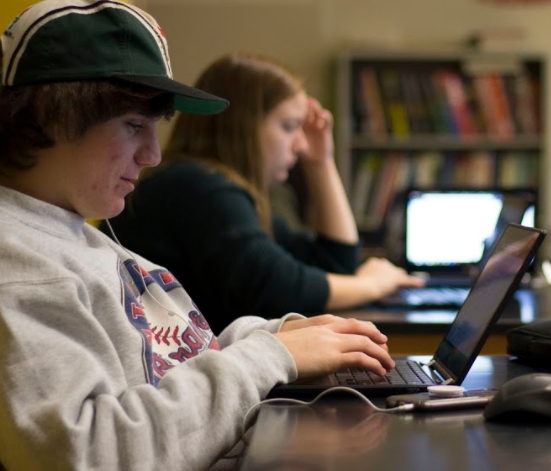In this technological age, new additions to schools are necessary to change with the times.
In addition to IDs, 99 percent of Chamblee students received personal Chromebooks. Items such as these have been distributed to other students across the country for years. These new laptops should facilitate the learning process, as well as prepare students for the real world.
Several aspects of the educational system have transferred online. On syllabi, oftentimes students may see where teachers ask if students have access to a computer at home. Nowadays, it is nearly impossible to get by without one.
“You need a computer for everything,” said Chamblee Assistant Principal Shervette Miller-Payton. “We want to make sure in this digital age that everybody has access. Yes, some people here have computers, multiple computers at home, and then we have people who don’t. So instead of trying to guess and figure out who has one and who doesn’t, we’re leveling the playing field, making sure everybody’s on the same standard.”
Miller-Payton claims that without access to computers and familiarity with common computer applications, students will be at a disadvantage going into college and the workforce.
Teachers were already required by the administration to incorporate technology into their classes, but availability of technology caused setbacks in the past.
“Everyone didn’t have the same access,” said Miller-Payton. “Sometimes you weren’t able to get into the computer lab or the computers were broken or students didn’t have computers at home. So now that everybody has the same access, they can do it more easily.”
As technology changes and becomes more accessible, schools are adapting as well to better prepare students for the world they will be entering post-secondary schooling.
“I’ve always thought where [technology] was going,” said Miller-Payton. “We’re living in a society where we’re walking around with tracking devices on us in our phones through GPS. It is very much like the Jetsons. Science fiction films are not far away. We can still do traditional things. We’re still going to analyze literature and tackle hard topics but having technology is going to make it more convenient and more fun.”
Hopefully, the introduction of laptops will be helpful in more ways than one.
“Our school spends about $15,000 on paper and ink,” said Miller-Payton. “That’s crazy. Think of the stuff we could do with $15,000. It’s smarter and more efficient to use technology. Technology does have disadvantages. It does have flaws, but when it can make your life better, we should use it. It can make your life a little more smooth.”
Junior Giselle Washington was surprised to see students in the cafeteria using their personal laptops.
“It’s really strange,” said Washington. “Freshmen sit here on laptops and do whatever. I mean, we never did that. I just think of the little kids I see that grew up with iPads in their hands. They will grow up with new technology that we never had and I can’t imagine how learning is going to change here.”
Junior Samantha Huggins made guesses with friends as to what the school would be like in the future.
“I’ve seen the movies,” said Huggins. “I know how this works. Sooner or later we’re going to get chips in our arms to scan when we come and go. At UGA they already make you scan your eye at the dining hall.”
Chamblee is nowhere near that point yet, however the school is far from where it was.
“When I first came to this school in the old building we had maybe 12 smart-boards in the whole building and I had just come from an elementary school where every single classroom had a smart-board,” said German teacher Aukini Anderson. “So, I’m glad we have smart-boards and lots of laptop carts, but I don’t necessarily think having a laptop all the time is an aid to learning or instruction.”
Nevertheless, laptops are here. And the only way to go from here is forward.
“I think we will get there,” said Miller-Payton. “I think a lot of people are resistant to technology because they’re accustomed to how they were taught and brought up, but it’s unavoidable.”
A future of technology is definitely coming, although there are still uncertainties about how and when.
“As long as teachers are undervalued and over prescribed and over supervised in their activities, the ‘Jetsons’ world of education is far away,” said Anderson.








